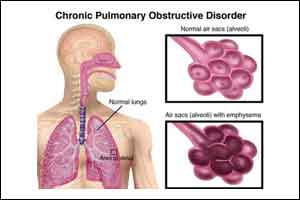- Home
- Editorial
- News
- Practice Guidelines
- Anesthesiology Guidelines
- Cancer Guidelines
- Cardiac Sciences Guidelines
- Critical Care Guidelines
- Dentistry Guidelines
- Dermatology Guidelines
- Diabetes and Endo Guidelines
- Diagnostics Guidelines
- ENT Guidelines
- Featured Practice Guidelines
- Gastroenterology Guidelines
- Geriatrics Guidelines
- Medicine Guidelines
- Nephrology Guidelines
- Neurosciences Guidelines
- Obs and Gynae Guidelines
- Ophthalmology Guidelines
- Orthopaedics Guidelines
- Paediatrics Guidelines
- Psychiatry Guidelines
- Pulmonology Guidelines
- Radiology Guidelines
- Surgery Guidelines
- Urology Guidelines
Short term oral steroids for acute exacerbations of COPD

Chronic obstructive pulmonary disease (COPD) is a long-term lung condition that is commonly associated with smoking. Patients with COPD may experience exacerbations usually precipitated by infection when symptoms become markedly worse necessitating hospitalization.Current guidelines recommend that patients with acute exacerbations of chronic obstructive pulmonary disease (COPD) should be treated with systemic corticosteroid for seven to 14 days.Dr.Walters JAE and colleagues conducted a study to compare the efficacy of short-duration (seven or fewer days) and conventional longer-duration (longer than seven days) systemic corticosteroid treatment of adults with acute exacerbations of COPD. The researchers found that five days of oral corticosteroids are likely to be sufficient for treatment of adults with acute exacerbations of COPD, and the likelihood is low that shorter courses of systemic corticosteroids (of around five days) lead to worse outcomes than are seen with longer (10 to 14 days) courses.
The researchers looked for all studies that compared oral or injected corticosteroid treatment given for seven or fewer days versus treatment given for longer than seven days in people with acute exacerbations of COPD and searches were carried out using the Cochrane Airways Group Specialised Register of Trials, MEDLINE and CENTRAL (Cochrane Central Register of Controlled Trials) and ongoing trials registers up to March 2017.Randomised controlled trials comparing different durations of systemic corticosteroid defined as short (i.e. seven or fewer days) or longer (i.e. longer than seven days). Other interventions—bronchodilators and antibiotics—were standardised.
They found eight studies suitable and meeting selection criteria which included 582 people with COPD who experienced a flare-up that required extra treatment in hospital. These studies compared oral or injected corticosteroid treatment given for seven or fewer days versus treatment for longer than seven days. Most of the people in these studies were in their late sixties and had severe or very severe symptoms of COPD; more men than women took part.The eight studies included in this review were generally well designed, and the quality of the evidence was rated as moderate because of imprecision in results.
The researchers did not observe any differences between shorter and longer courses of treatment. People treated for seven or fewer days did not have a higher rate of treatment failure or longer time to their next exacerbation; the number of people who avoided treatment failure ranged from 51 fewer to 34 more per 1000 treated (average 22 fewer people per 1000). Time in hospital and lung function (blowing tests) at the end of treatment were not different. No differences in side effects or death were noted between treatments. Information on quality of life, which is an important outcome for people with COPD, is limited, as only one study measured it.
The authors concluded that five days of oral corticosteroids are likely to be sufficient for treatment of adults with acute exacerbations of COPD, and this review suggests that the likelihood is low that shorter courses of systemic corticosteroids (of around five days) lead to worse outcomes than are seen with longer (10 to 14 days)courses.Intermittent systemic corticosteroid use is cumulatively associated with adverse effects such as osteoporosis, hyperglycemia and muscle weakness. Shorter treatment could reduce adverse effects.
For further reference log on to : DOI: 10.1002/14651858.CD006897.pub4

Disclaimer: This site is primarily intended for healthcare professionals. Any content/information on this website does not replace the advice of medical and/or health professionals and should not be construed as medical/diagnostic advice/endorsement or prescription. Use of this site is subject to our terms of use, privacy policy, advertisement policy. © 2020 Minerva Medical Treatment Pvt Ltd